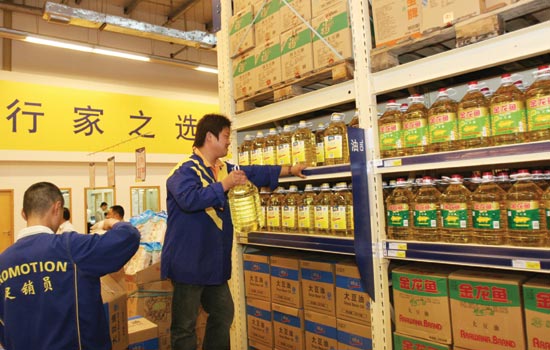
|
 |
|
A Metro Cash and Carry outlet in Nantong, Jiangsu province. The international self-service wholesaler currently has 56 stores around China. [Photo/China Daily] |
One of Metro's key tasks in the next few years is developing relationships with small and medium-sized traders. They tend to be operations with little capital investment and many are run by couples. Consultants will be sent to advise them on store design and marketing to them.
The president said he is aiming to make China the biggest market on the company's global map thanks to its growing population and increasing demand.
Assigned to president of Metro China in October 2011, Hoelzer said the job fulfilled his wish to return to Asia and was "a big honor". He worked in Vietnam for a few years.
To achieve his mission, Hoelzer has set out a series of plans to accelerate Metro China's expansion. These include developing an online trading platform, increasing the number of traditional brick-and-mortar stores around China and strengthening relationships with more Chinese restaurants.
The online platform started operations in May. "I admit that our speed of expansion was not so high in the past. On average we open a little more than three stores a year. This is not something that is really good," said Hoelzer.
Having entered China in 1995, Metro currently has 56 stores around the country, with six in Shanghai. It celebrated the opening of its second store in Xi'an, Shaanxi province, on Wednesday.
Metro China's sales revenue totaled 1.5 billion euros ($1.84 billion) last year, an increase of 18 percent from 2010.
For the company, it was an extremely good year. However, compared with locally developed wholesale markets, the sales performance was not that outstanding.
For instance, Shanghai Jiangyang Agriculture Products Trading Market, one of the largest wholesale markets in Shanghai's Baoshan district, reported 3.75 billion yuan ($589 million) in sales revenue in 2007. In addition, China Commodity City in Yiwu, Zhejiang province, one of the largest small commodity wholesale markets in China, generated 50 billion yuan in sales revenue last year, 12 percent higher than the figure in 2010.
According to data from China Chain Store & Franchise Association, Metro China ranked a distant 38th among the top 100 chain store operators in China in 2011 in terms of sales volume.
As a chain wholesale operator with a different business model, Metro China's store opening speed is much slower than some large international rivals such as US-based Walmart Stores Inc (branded as Walmart since 2008) and France-based Carrefour SA. By the end of 2011, Walmart had opened 267 stores in China and Carrefour had 203 around the country. Carrefour reported 42 billion yuan in sales revenue in China in 2010.
However, Metro remains positive about the Chinese market. It estimated that the nation's wholesale market size is worth roughly 4 trillion yuan, which provides tremendous business opportunities for the company.
However, slow speed in expansion may not mean something bad for Metro China from Hoelzer's perspective, especially for a foreign company that might not be familiar with the Chinese market at this early stage.
Learning by trial and error is a strategy taken by many foreign companies, including Sweden-based Ikea, which said it would undergo rapid expansion from 2011.
"On the other hand, sometimes, it is better to go for less speed and more quality, instead of being too fast or doing something that is perhaps not successful at the end of the day. What I want to say is, we have a business model which is well-developed now," said Hoelzer.